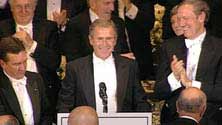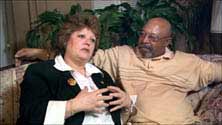Fahrenheit 9/11 (2004)
 |
FAHRENHEIT 9/11
Review by Gnoll |
I didn’t like FAHRENHEIT 9/11.
Now, I know that you’ve already got your hate e-mail composed and ready to go, prepared to call me a “neoconservative” or some other ridiculous term that you probably can’t define, but listen up for a second.

I liked Michael Moore’s other “documentaries”. I enjoyed BOWLING FOR COLUMBINE, despite the fact that much of its information was dubious. I enjoyed THE BIG ONE and ROGER AND ME as well. But FAHRENHEIT 9/11 was an ineffective, unengaging film.
You see, I have an advantage over most people out there: I think for myself. There are two camps who are primarily talking about FAHRENHEIT 9/11. First, there are the folks who think George W. Bush is the devil and will believe anything that shades him in a negative light. On the other hand, there are the folks who think that George W. Bush can do no wrong and will call anything that defames their idol a lie.
And then there’s me. I don’t classify as a left-winger or a right-winger, because my set of beliefs collect ideas from both ends of the spectrum and meet somewhere on the “up” end of things. That alone makes me better than either the parrots at one end of that spectrum or the sheep at the other to discuss this film. And since the current political climate would lead you to believe that there are no moderates anymore, only extremists who blindly follow their party line, then that makes me better than the vast majority of people out there to do such things.

But I didn’t come here to talk politics. I came here to talk movies.
You see, this here is called Movie Criticism for the Retarded for a goddamn reason, and unlike most reviewers, I’m not going to cloud my review of the film with any political bias. I didn’t when I reviewed BOWLING FOR COLUMBINE nearly two years ago, and I won’t now. I didn’t like FAHRENHEIT 9/11 for reasons completely unrelated to the political content, and I’ll tell you why.
You see, Moore’s latest film is lacking the one thing that made his others work: humor. Now, before you go on and start phase two of your e-mail campaign because you were so busy laughing your ass off at George Bush’s soundbytes, keep in mind that Moore isn’t responsible for those laughs.
When Michael Moore was fighting for disenfranchised industrial workers, he had fun with it. When he was exposing corporate greed and crooked politicians, he had fun with it. And even when he was rallying against the American culture of violence, he had fun with it.

But FAHRENHEIT 9/11 is too serious a subject for Moore to go into and still have fun with it. Moore genuinely hates the current Commander-in-Chief and and all that he stands for. He comes into the film angry and vigilant rather than flippant and critical. Moore even gets to the point here of trying to assume what the people he is criticising are thinking, narrating what he believes their thoughts to be in almost a matter-of-fact sensibility. He begins to believe his own tinfoil-hat conspiracy theories to the point where he starts to come off more as a nutcase than a pundit, and it certainly doesn’t serve his cause well.
Missing are the witticisms and clever editing jobs that made his other films fun and entertaining. Gone is the aloof, sarcastic fat guy who pulled off goofy stunts to prove his points. Oh, sure, there are a few here and there, but most of the gags fall flat. The only one that really works is a bit in an ice cream truck, but even that scene fails in comparison to some of his earlier work, mainly because of its brevity. He’s spent the last few minutes telling us how evil this Patriot Act thing is and points out two or three of its worst elements (I personally oppose the Patriot Act, so I can’t disagree with him here, although his real-life examples are a bit thin) but fails to let us — or the congressmen he’s reading it to — judge for ourselves. We’re just supposed to trust Moore on this issue.

On top of that, too many of his stunts are based on fallacies. One of his biggest ones here involves Moore waddling around Washington D.C. attempting to get congressmen to sign up their children for military service. When these politicians look at Moore like he’s crazy, it isn’t because they don’t like his politics. It’s because the idea that one could sign up their own children for the military is a huge logical fallacy. It can’t happen. In our volunteer military, the only person who can make that decision is the one who is signing up. As a result, the sequence bellyflops and makes no point whatsoever.
And while I’m not here to talk politics, the amount of bias here prevents Moore from making his points in many cases. For instance, at one point Moore tries to trivialize the “coalition of the willing” by pretending that the most prolific countries that supported the American war effort were countries like Palau, Romania, and Iceland; when anyone with a working knowledge of world events can rattle off a dozen or so countries that actually made a difference in this thing: Great Britian, Australia, Spain, Italy, Japan, South Korea, Turkey, and several former Soviet republics for starters. In the same breath, he paints these “lesser” countries with ridiculous stereotypes that make him look just like the condescending American that he so often tries to vilify.
And again, while I try to avoid getting in to the politics of it, there are a few other points that I can’t help but touch upon. For example, Moore spends a good chunk of the film demonizing the Saudis. He lambastes their presence in our economy and goes so far as to assert that the 15 extremists who were responsible for September 11 are somehow indicitave of the country as a whole. But while doing all of this, he never offers a concrete reason why he thinks the Saudis are so awful. If it’s all about the oil, then why doesn’t Moore offer any suggestions for alternatives? Whether he likes it or not, we do have to rely on oil at this point in time, and it certainly serves our country to remain friendly with the house of Saud. I also notice he never mentions the previous administration’s responsibility for such things, almost as if we leapt from 1992 to 2000 without any sort of accountability. And yes, I do realize this is all due to his bias, but it really comes off as sensationalist nonsense when his argument here is so transparent.

In fact, the best part of the film is the opening segment, where Moore talks about the controversial 2000 election and compares it to a dream sequence. But after three and a half years, Moore comes off like a whining baby who can’t get over it, regardless of how much truth there is to the idea of the election being “stolen”. The scene also goes on for a good ten-fifteen minutes, which tells you right up front that we’re not about to witness a documentary about the current war on terrorism, as Moore would want you to believe. No, we’re looking at an outright and blatant personal attack on the President tht thinly disguises itself as a documentary.
And most importantly, any effectiveness that is presented here (beyond the opening segment) is not the result of Moore’s ability as a filmmaker, but rather from the footage he’s using. Moore spends a long time with the mother of a casualty of the Iraq war from Flint and her family. Their emotion is very real, and is very effective in pushing Moore’s agenda. However, Moore isn’t responsible for this. Moore isn’t responsible for the graphic footage of soldiers being blown apart or Iraqi children in hospitals. Moore isn’t responsible for the words that come out of George W. Bush’s mouth. Moore simply assembled it all, and the less he has his hands on it, the more effective it is. For instance, when he shows Iraq “pre-invasion”, he portrays it as this place that might be confused with paradise. He never even slips in a notion that Saddam Hussein was a reprehensible human being. In fact, the footage he shows of Saddam shows him as a jovial guy dancing with friends, and then goes so far as to claim that an American citizen was never killed by Iraq (ignoring a huge chunk of history from the early 90s.) It goes from being irresponsible documenting to reprehensible beatification of a man who is responsible for the deaths of over one million civilians.
And Moore does nothing at all to take anyone to task other than those with an “R” next to their name. Despite the fact that he takes a blanket swipe at the U.S. Senate for failing to support a complaint by African-American members of the house in regards to the 2000 election, but manages to spin it into a criticism of Republicans. One of those who turned his back on the issue is the same man that Moore will be voting for this November.

Well, so much for keeping the politics out of it. But back to the bottom line, this is by leaps and bounds an inferior film to Moore’s previous efforts as a director. Part of where it loses its effectiveness involves Moore himself. He’s become too big for his britches (in as literal and as figurative a sense as you can get) and no longer speaks for the everyman.
My biggest criticism of this film is that Moore uses it to vilify George Bush for using war to gain a fiscal advantage, while this film simply does the same thing for Moore. Moore is making millions off of FAHRENHEIT 9/11, and if that ain’t exploitation, then I don’t know what is.

 subscribe to rss
subscribe to rss 

























Leave your response!